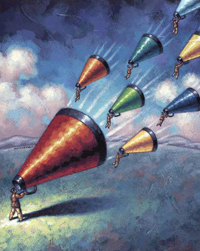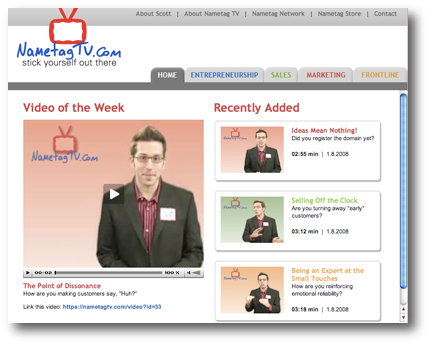
 Rehearsal.
Rehearsal.
Meditation.
Visualization.
Deep breathing.
Perusing your notes.
Reading affirmations.
Practicing your Powerpoint slide transitions.
Listening to the Rocky IV soundtrack in the bathroom down the hall.
All of these are examples of how someone might prepare herself to speak.
Which brings up an interesting question:
How much time do you spend preparing yourself to listen?
Odds are, not that much.
And this is dangerous. Because listening requires just as much energy, focus and mindfulness as speaking – if not more!
So, today we’re going to explore four practices for preparing yourself to listen.
1. Consult your materials. Gather all your notes, ideas, reports or any other documents relating to the conversation you’re about to have. Take a few minutes to scan them. Look for patterns. Get to know the person and the situation better. Jot down any specific questions, concerns or issues you’d like to raise during the interaction.
2. Listening reminders. Take a minute to re-read all of your listening reminders. This is a great way to keep your philosophies and practices fresh in your mind. NOTE: if you haven’t already created listening reminders for your office, consider writing a few of the following ideas on sticky notes to keep yourself accountable:
o L-I-S-T-E-N = S-I-L-E-N-T
o 2 ears, 1 mouth
o Attention, acknowledgment, appreciation and affirmation.
o Responses, not answers.
o Listening, not waiting to talk.
o NO Agenda.
o Don’t react; respond.
o Ask; don’t tell.
o Curious, not judgmental. http://www.blogger.com/img/gl.link.gif
o You don’t own their problem.
o Listening isn’t a performance.
If you want to see the FULL list of listening reminders, check this out.
3. Breeeeeeathe deep. Taking in fresh oxygen will lower your blood pressure and relax your mind, body and spirit. It will also lay a foundation of mindfulness that will enable you to ask the right questions and tap into your intuition during the listening process.
A few secrets for breathing exercises (that I learned from my buddy Robert Friedman) include:
o In through your nose, out through your mouth.
o Make your exhale twice as long as your inhale.
o Consider reciting silent mantras to focus your attention.
o Close your eyes and visualize yourself Growing Bigger Ears.
o Relax your body, let go of tensions, especially in your shoulders and neck.
4. Affirmations. This last practice might sound kind of silly, but it’s also the most effective. Write out three lists of affirmations, each of which start with “I will, I choose or I am.” Be sure to keep them positive and focused on what you want and not what you DON’T want!
See, by reciting these to yourself before the other person comes into the room, you will lay a positive, forward-thinking foundation of listening effectiveness.
Here’s a quick list of potential affirmations for your list. Consider reading these to yourself before meeting with clients, patients or customers; or if you hold a leadership/management position, before walking into work every morning:
I WILL…
o I will listen today.
o I will say what I see.
o I will ask WHAT or HOW.
o I will take organized notes.
o I will think and pause before responding.
o I will listen at least twice as much as I talk.
o I will listen to myself as well as the other person.
o I will listen to ideas that make me uncomfortable.
o I will lead the other person where they want to go.
o I will listen to the silences between people’s words.
o I will acknowledge, appreciate, affirm and give attention to the speaker.
I CHOOSE…
o I choose to monopolize the listening.
o I choose to remain emotionally objective.
o I choose to use engaging, generative language.
o I choose to give advice ONLY when asked for it.
o I choose to ask and say the things that want to be said next.
o I choose to be conversationally selfless by giving the other person the stage.
o I choose to show the other person that I trust them to develop their own answers.
o I choose to listen with my eyes, arms, hands, fingers, legs, heart, mind and soul.
I AM…
o I am a giant question mark.
o I am curious and fascinated.
o I am now fully prepared to listen.
o I am making it a safe place to open up.
o I am prepared to receive the other person.
o I am making space to accept new ideas and thoughts.
o I am giving myself and the other person permission to open up and feel comfortable.
o I am a Listening Midwife who enables the other person to give birth to their thoughts, feelings and emotions.
o I am a still body of water in which the other person can see their reflection, which will lead to breakthroughs of their own making.
– – –
Admittedly, this is a lot of work. Probably more than most people are willing to put in for a soft, intangible skill like listening.
In fact, even I was hesitant to take on this practice at first.
Until recentlty.
I had two Rent Scott’s Brain consulting sessions this week. Both were great successes, inasmuch as my two clients gained clarity as well as few SOLID strategies for their businesses.
I, of course, didn’t do that much, other than listen.
Because that’s my job. And I now realize that by adopting this practice of listening preparation, I was able to facilitate and to give birth to breakthrough thinking.
It was pretty cool!
So, what about you?
LET ME ASK YA THIS…
How much time do you spend preparing yourself to listen?
LET ME SUGGEST THIS…
Share your best practices for listening preparation here!
* * * *
Scott Ginsberg
That Guy with the Nametag
[email protected]
…only 4 more days until NametagTV.com goes ON AIR!

